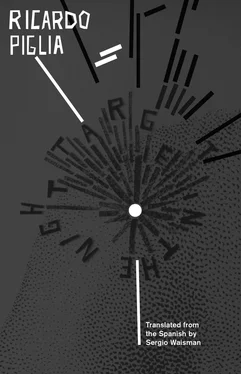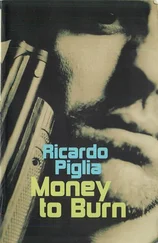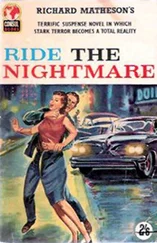“I’d like to clear up one point,” Croce said. “You called him at the hotel.” It didn’t sound like a question, and Luca the Gringo became serious.
“We asked Rocha to call him.”
“Aha.”
“He was looking for us, they said.”
“But you didn’t speak with him.”
Rocha appeared at that point, at the door, like a shadow, under an arcade. Slight and very thin, timid, with black welding goggles pushed up on his forehead, he was smoking, looking down. He was the great technician, Luca’s main assistant, his right-hand man, the only one who seemed to understand Luca’s projects.
“No one picked up the phone,” Rocha said. “I spoke with the telephone operator at the hotel first, she transferred me to the room, but no one answered.”
“What time was that?”
Rocha was thoughtful, the cigarette hanging from his lips.
“I couldn’t say…One-thirty, two.”
“Closer to two or to one-thirty?”
“To one-thirty, I think, we’d finished lunch, but I hadn’t slept my siesta yet.”
“Good,” Croce said, and turned back to Luca. “And you never saw him?”
“No.”
“Your sister says—”
“Which one?” Luca looked at the Inspector, smiling. He made a gesture with his hand, as if he shooing an insect away from his face, and stood up to heat more water for the mate .
Luca seemed restless, as if he had started to feel the Inspector was actually hostile and maybe even suspected him.
“They say that Durán had an arrangement with your father.”
“I don’t know anything about that,” Luca cut him off. “You should ask the Old Man himself.”
They kept talking a little longer, but Luca had closed up and barely spoke anymore. Shortly afterward he excused himself, saying he had to keep working, and asked Rocha to see the Inspector out. He placed the iron mask with the protective visor on his face and walked away, taking large steps down the glass-covered hallway toward the workshops.
The Inspector knew this to be the cost of his profession, he had to ask the questions that might help him solve the case, but no one could speak with him without feeling accused. And was he accusing him? Croce followed Rocha out to the parking lot and got in his car, certain that Luca knew something that he hadn’t told him. He drove slowly through the lot toward the gates that opened out — but then, unexpectedly, the factory’s reflectors shifted, shining bright white, catching Croce and holding him in its glow. The Inspector stopped the car and the light also stopped, blinding him for a moment. He sat still in the middle of the brightness for an endless instant until the lights moved on and Croce started driving his car again slowly out toward the road. In the night’s darkness, with the tall light intermittently illuminating the countryside, Croce realized the terrifying intensity of Luca’s obsession. He saw Luca’s gesture again, his hand in the air as if shooing an insect from his face, an invisible pest. He needed money, how much money? He carried a brown, leather bag in his hand.
He had decided to return to town on the main road, but before he reached the station, he turned toward the corrals and parked his car in the alley behind the hotel. He lit a cigarette and smoked, trying to calm down. The night was peaceful, the only lights the streetlights in the square and a few lighted windows on the upper floor of the hotel.
Would the service entrance be open? He could see the door on the right, the railing and the stairs leading down to the basement for deliveries. It was close to midnight. The alleyway was dark. He got out of his car, turned on his flashlight, and followed the beam to the door. He used the picklock he always carried with him. The lock clicked open.
He went down an iron stairway and into the tiled hallway, past the telephone switchboard in the shadows, and found the door to the storage room. It was open. He stopped in front of the piles of unorganized items and abandoned objects. Where would they have hidden the bag? They must have come in through the service lift and looked around to see where they could hide it. Croce figured the murderer didn’t know the place ahead of time, that he would have been moving quickly, that he would have been searching to leave what he was carrying. But why?
The storage area was a vast underground room, about fifty meters long, with vaulted ceilings and tiled floors. There were chairs off to one side, boxes to another, there were beds, mattresses, picture frames. Was there an order? A secret order, accidental. He had to look not just at the objects, but at the way the objects were distributed in the space. There were couches, lamps, suitcases piled up toward the back. Where could someone who has just come down an old, dusty service lift hide a bag? When the person came out of the chute he would be partially blinded by the light, in a hurry to go back up — by pulling on the sheave and the ropes — to the room with the dead body, and leave the room out the door and into the hallway, as the witnesses had said. Is that how it was? Croce followed the images that appeared to him like a gambler betting against the house who doesn’t know what the next card will be, but bets as if he knew . The Inspector suddenly felt tired, without any strength. A needle in a haystack . Maybe the needle wasn’t even in the haystack. Still, he had the strange conviction that he’d find the trace. He had to think, follow an order, track what he was looking for in the confusion of the abandoned objects.

14 People in small towns turn off the lights in their houses early in the evening, at which point everything turns gray, because the landscape under the moon is gray. The only way you know then that there is a house in the middle of the plains is by the barking dogs, one barks and then another, and then another, the barking can be heard in the vast shadows in the distance.
Inspector Croce Manipulates Evidence , was the leading headline in the local El Pregón newspaper the next morning. The story contained information that shouldn’t have been made public, mentioning aspects of the investigation that should have been protected by the secret nature of police activities. Official sources confirm that Inspector Croce returned to the Plaza Hotel late last night and went down to the storage room full of lost objects, later departing with several items that might be part of the investigation. How had the news gotten out, why were the facts presented like that? These questions no longer worried Croce. Exclusive statements by General Prosecutor Cueto , the newspaper said. An interview, photographs. Ever since he’d been placed in charge of the Prosecutor’s Office, Cueto had been building a campaign in the press against him. As the main reporter at the newspaper — one Daniel Otamendi — had written, Croce was Cueto’s bête noir . “I just learned that I have a rival who cares that much about me,” Croce said.
Cueto didn’t care about him, he just wanted to get Croce out of the way, and he knew that the key was to use the press to discredit him. The Prosecutor maintained that Croce was an anachronism, he wanted to modernize the local police force, and he treated Croce as if he were a rural cop, a sergeant in charge of a card game. The problem was that Croce solved all his cases.
The Inspector wasn’t intimidated by the leading headlines in the newspaper, but he was worried. The news of the murder of an American in the province of Buenos Aires had taken a national character. News was contagious, reporters would start flooding in like a leak through the roof of a country house.
Читать дальше













